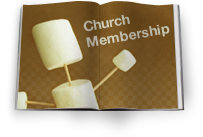Book Review: Loving the Church, by John Crotts
In the last several years, many evangelical Christians have begun to take two vital institutions more seriously: the family and the local church.Yet what would happen if, instead of seeing these two institutions as partners, we began to pit one against the other? Hard to imagine.
Nevertheless, it is happening. This is the primary reason why John Crotts, pastor of Faith Bible Church in Sharpsburg, Georgia, wrote Loving the Church: God’s People Flourishing in God’s Family.
A WINSOME APOLOGETIC FOR THE CHURCH
As a faithful pastor of the same local church for over fifteen years, Crotts is burdened to equip Christian families to devote themselves to spiritual growth in the home. Yet among some evangelicals, he sees that that growth is being “disconnected” from any commitment to a local church (ch. 2). If you are familiar with many of 9Marks’ resources, you will not find this book to be full of new insights. Yet the author approaches his topic in a fresh and accessible way: he simulates a conversation with five Christians at a coffee shop.
The book proceeds in two main sections. Section oneexamines what the Bible teaches about the church. In this section Crotts does an excellent job of allowing the Bible to define the “blueprint of the local church,” its value to Christians, and why every Christian should be engaged in and committed to it.
Through his fictional dialogue, Crotts addresses some of the questions that Christians who neglect the church most commonly ask about the church. Further, Crotts highlights some key aspects of the church, such as Christ’s headship, the authority of God’s Word, elders, deacons, and the role that each Christian is to play (ch. 5).
Section two applies section one’s biblical arguments in order to help the reader understand how to act upon what God’s Word has revealed. Though the author’s focus is on families, every chapter can easily be applied to an individual Christian.
This section is practical and accessible. It accurately lays out how Christian families should see the local church as not only central in God’s plan for them, but also as a tremendous benefit, not a burden, to them. Through many helpful illustrations, Crotts shows how it is a benefit to a Christian and their family to submit to Christ and his plan for the church (ch. 7), to allow pastors/elders to teach and shepherd them (ch. 8), to serve alongside deacons (ch. 9), and to embrace the fellowship and accountability that every Christian needs in order to walk faithfully with Christ (ch. 10).
WAYS THIS BOOK IS OF BENEFIT TO PASTORS
There are many benefits to this book for Christian families and individuals alike. In addition, here are some ways this book should particularly benefit pastors:
1. It’s a good tool for teaching people about the local church.
This book is a fun, easy read, yet it is chock full of rich, biblical content that would provide any Christian with a deeper understanding of the local church.
2. It highlights the significance of your preaching ministry.
Because the sermons of “famous pastors” have become so easily accessible, many so-called ordinary pastors grow discouraged and insecure about the value of their own preaching. Crotts encourages pastors to stay faithful in their preaching labor because God’s plan is for local churches to be led and fed by individual shepherds who watch over them:
When you are a member of a local church, God’s Word is applied specifically to you and your family by leaders who know you and see you functioning within the body of Christ. The specific elders that Jesus raised up in your church are personally charged to watch out for your soul and the souls of your family members.(96)
3. It reminds us why the biblical standard for a pastor exists.
A husband and father is called by God to shepherd his family. However, God’s plan is not that a Christian man should shepherd alone. Who helps that man shepherd his family? Who shepherds that man to faithfully shepherd his family? Pastors, we do! The author vividly portrays the pastor’s biblical calling (1 Tim. 3:1-7, Tit. 1: 5-9, 1 Pet. 5: 1-4) in order to help the reader realize that each family needs a shepherd outside themselves, and the husband/father needs assistance in his shepherding task.
This book speaks a piercing word to pastors. It reminds us of the biblical standard to which God calls us. And it reminds us why we must continue in faithfulness to that standard, for the sake of our own family as well as the local church that has been entrusted to us (1 Tim. 3:4-5).









